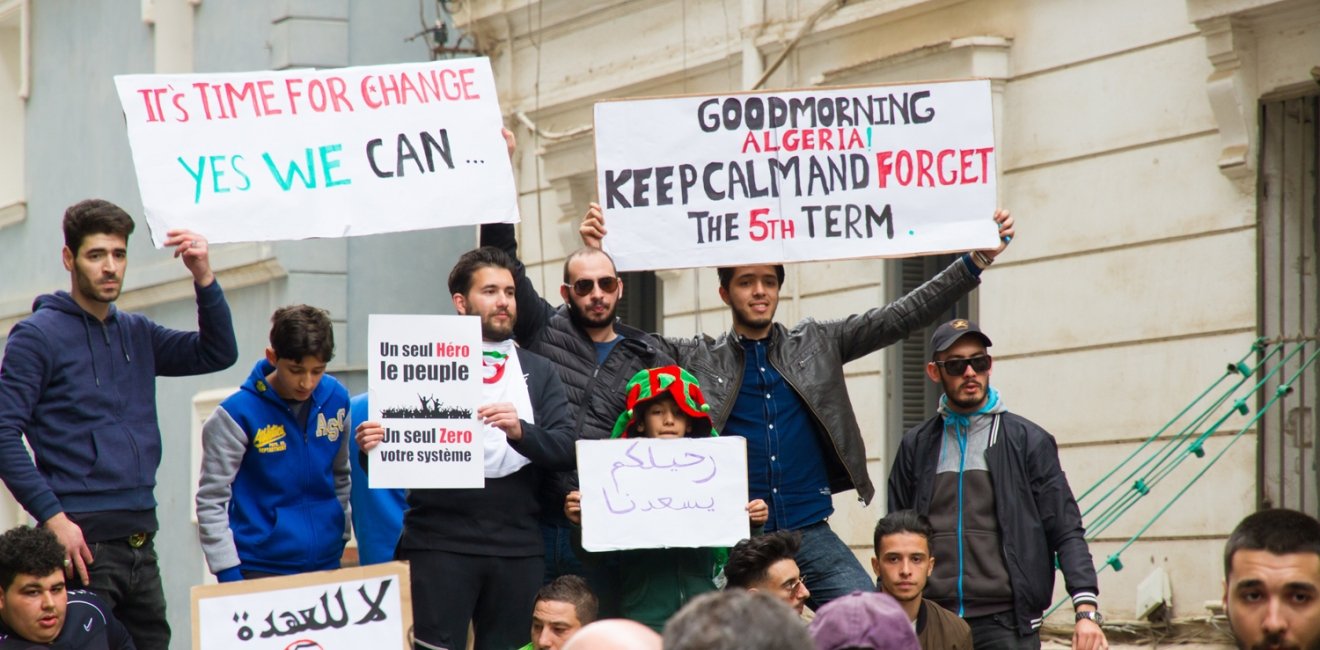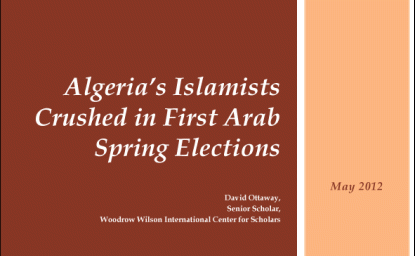After twenty years in power, Algerian President Abdelaziz Boutefika is the latest Arab leader to succumb to a popular uprising of massive discontent, bowing on April 2 to the street and his own military’s demand that he resign immediately. Four other Arab strongmen met the same fate for the same reason in 2011, and each time the result has been short-term political chaos (Tunisia and Egypt) or long-term civil war (Libya and Yemen).
Already, Algerian protesters in the hundreds of thousands have demanded over the past seven weeks not only that their 82-year-old, wheel-chair bound resign. They also want the whole political system of phony democratic institutions, manipulated by a coterie of octogenarian military and civilian figures who led the country to independence 57 years ago, scrapped as well.
The question now is whether Algeria will take the Egyptian way where military dictatorship was the outcome, or the Tunisian way where a civilian-led authentic democracy emerged? In fact, many Algerians have long feared yet another scenario, the so-called “Cuban way” wherein Bouteflika would pass power on to his brother, the way Fidel Castro did in 2011 to his brother, Raul. The crippled Bouteflika has no children, and his brother, Said, 61, has become his closest advisor, widely viewed as the Machiavellian manipulator of the regime’s opaque politics.
The question now is whether Algeria will take the Egyptian way where military dictatorship was the outcome, or the Tunisian way where a civilian-led authentic democracy emerged?
There is at least a slim chance that neither the Egyptian nor Cuban example will be repeated in Algeria and that some version of the Tunisian way may prevail. It is certainly true that the military in Algeria as in Egypt is the main power center and decision-maker. But it is nowhere near as popular. This is because the Algerian military is widely viewed as part of the core problem of corruption, cronyism and phony democracy long afflicting the country. In Egypt, by contrast, the military was hailed as the country’s savior by secularists who cheered its overthrow of the short-lived Islamic government there in July 2013.
Moreover, the Algerian army is no longer needed to prevent Islamist groups from taking power as almost happened in elections in the early 1990s. (Islamist parties won just 33 out of a total of 462 elected deputies in the 2017 parliamentary elections.)
Bouteflika was the military’s choice in 1999 to put an end to a vicious civil war involving Islamist extremists that had cost the country over 100,000 lives. He was the epitome of the worn-out “revolutionary generation” that had led the eight-year-long guerrilla war for independence from France in 1962 and then rule ever since.
It was seven years ago that Boutefilka surprised Algerians by declaring “Our generation is finished” in a fruitless bid to get them interested in voting in the 2012 parliamentary elections . (Only 43 percent showed up). Unfortunately, he failed to take his own advice and retire then. The following year, he suffered a stroke that has left him wheelchair-bound and nearly speechless ever since. Doctors in French and Swiss hospitals kept him alive to avoid a power struggle among feuding military and civilian clans that make up Algeria’s political elite.
He promised not to run again but pleaded for time to fulfill his “final duty” to birth “a new republic”
That fear led to Bouteflika announcing in early February he would run for a fifth, five-year term, and he initially set presidential elections for April 18. Then under rising pressure from the street, he called on March 11 for the holding of a national conference to re-write the constitution and organize a new poll. He promised not to run again but pleaded for time to fulfill his “final duty” to birth “a new republic” and a “new Algerian (political) system” before stepping down.
Algerians would have none of his delaying tactics and kept up massive Friday street demonstrations across the country until the ultimate arbiter of power, the military, finally abandoned him; On April 2, Army Chief of Staff Gen. Amed Gaid Salah ordered the constitutional council to declare Bouteflika incompetent to hold office any longer.
Whether it was Bouteflika’s own decision or his brother’s to run for a fifth term, the announcement on February 10 was the last straw and triggered the uprising. It was led initially by the country’s restless youth suffering from a jobless rate of 25 percent and grim prospects for employment. Then professional groups—lawyers, judges and architects—war veterans, and workers joined in. The demonstrations have miraculously remained largely peaceful, with no deaths and few clashes with the police reported so far.
Boutelfika has played a central role throughout the history of independent Algeria, Africa’s largest nation with 42 million people and the continent’s’ biggest gas producer and number two oil exporter. A former student leader and short-time guerilla commander during the war against France, he became foreign minister in 1963 at the age of 26, the youngest of any worldwide at the time.
More significantly, Bouteflika was the immediate cause of the coup d’etat in July 1965 that put an end to the short-lived civilian rule of Ahmed Ben Bella and brought the military to power in the first place. It was Ben Bella’s attempt to fire him that provoked his wartime mentor and protector, army commander Col. Houari Boumediene, to seize power.
Ever since, Algeria has been ruled by the military intelligence which has chosen presidents and prime ministers while avoiding direct military rule. So it was that Bouteflika was chosen in 1999 to lead the country out of its bloody civil war. Against long odds, he succeeded. He did this by adopting a policy of “forgive and forget,” absolving both Islamists and the military of their respective atrocities and integrating several moderate Islamist parties into the political process.
Algeria’s immediate future is filled with unknowns.
Bitter memories of those atrocities helped to kept Algerians from rising up during the 2011 Arab Spring—and to keep Bouteflika and the military in power until now. They also remained quiescent when he changed the constitution in 2008 to allow himself to become president for life.
Algeria’s immediate future is filled with unknowns. There are tentative plans to hold a national conference to draft a new constitution and organize presidential elections within 90 days. At this point, Bouteflika’s cronies are still very much in control of the entire transition process, with his hand-picked head of parliament’s upper house, Abdelkader Bansalah, now interim president and another crony just named interim prime minister.
So far, no charismatic new leader has emerged from seven weeks of massive street protests. This has left outside observers wondering whether the uprising is capable of giving rise to a new era of civilian leadership. The fear remains that the country will be torn apart by infighting among feuding clans within the old elite, only to see the military once again emerging as kingmaker in Bouteflika’s promised “new republic” and political system.
Algerians have a special term, hogra or “disdain,” to describe the cynical behavior of this old elite toward the general public and its manipulation of the political system to stay in power the past half century. The current uprising has clearly changed the attitude of the military, at least temporarily. The question now is whether a mobilized street will put an end to this smug attitude permanently and finally force the “revolutionary generation” into retirement as Bouteflika himself called for in 2012.






